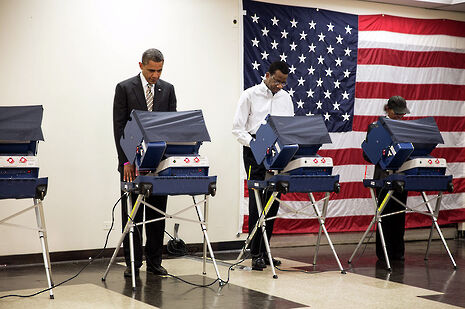Forget Donald Trump. The most influential person this year was the Voter
Manasij Hajra argues that Time magazine fell foul of the mark in choosing this year’s ‘Person of the Year’

On the morning of 7th December, Time magazine announced Donald Trump as their ‘Person of the Year’. I received the news with frustration, irritated at Time’s apparent insistence on awarding the title, without fail and regardless of competition, to the President-elect every four years. It feels rather superfluous to me that an individual who has not yet wielded the power to make any important decisions should be judged the most influential person of the year. Vladimir Putin or Narendra Modi (who, by a landslide, won the online poll that Time happily ignored) would have been superior choices. But in fact, if I were to decide who has embodied what was most important about 2016, one ‘person’ stands out glaringly: the Voter.
Bear with me before you deride the apparent violation of the rules on my part. Nowhere is it written that only one individual can be recognised, in spite of the name. Some might recall that, five years ago, ‘The Protestor’ was named Person of the Year; five years prior to that, ‘You’ – yes, you – held the title. Without a doubt, the collective action of voters across the world this year has been the major force of history in 2016, making them more than worthy of the crown.
In May, Labour’s Sadiq Khan, the son of an immigrant bus driver, was elected as the mayor of London, becoming the first Muslim to hold the position. He overcame the smear tactics employed by his opponent, Zac Goldsmith, who, by associating Khan with extremism, succeeded only in alienating voters and colleagues alike. In his victory speech, Khan proclaimed that he was “so proud” that London had “chosen hope over fear and unity over division”. He hoped that we would “never be offered such a stark choice again”.
“‘For good or ill’, as dictated in Time’s Person of the Year criteria, it was the Voter that wrote history on 23rd June.”
But as it happens, we were, in the eyes of many who voted on 23rd June. It was a momentous day, in which you could almost sense the rumbling shifts of history in the making, and was certainly the most significant political event I have experienced. Not many among us could claim that we were not at least a little surprised by the result, and many of those in my age group, and at Cambridge, watched in dismay as they reflected upon the seeming catastrophe that had befallen their country.
But whether the result was agreeable or not, one cannot deny that the voice of the Voter was heard that day, loud and clear. “For good or ill”, as dictated in Time’s Person of the Year criteria, it was the Voter that wrote history on 23rd June.

My appreciation for the power of democracy grew as I learned that we had voted to leave the EU, in spite of the tragic irony that I was a month and a half too young to vote. This was a fact that many young people bemoaned, and many critics were quick to argue further that the referendum should never have been in the Voter’s hands in the first place. But would there have been so many vehement critics of the democratic process if the British people had instead voted to remain in the European Union? I doubt it. Such criticism may have been aimed at the supposedly unfavourable result rather than democracy itself, and these critics risk a charge of duplicity if they do not also condemn the 1975 referendum that endorsed membership of the European Economic Community, a vote, one could argue, that should also never have happened.
The idea that Leave Voters did not know what they were voting for is alarming, however, and much ink has been spilled over the autonomy of the average Leave voter, and how informed they might really have been. What is clear, however, is that Brexit initiated a paradigm shift in politics that continued through the year.
In November, millions of voters, frustrated at the establishment, flocked to Donald Trump. Many laughed off Trump’s announcement of his candidacy in 2015, but the American electorate showed us how wrong we could be. They showed us that they would express their anger at the elite by picking a billionaire real estate mogul to run the country. White women, 53 per cent of them, showed us that they would favour a man with an unenviable track record in misogyny over the first female president of the US.
The Voter continued to show their collective force in Italy, where Matteo Renzi was thwarted by what was plainly a protest vote. And, frightened by this powerful wave of change and protest, liberals across Europe breathed a collective sigh of relief this December when Voters in Austria elected Alexander Van der Bellen as president over the Freedom Party candidate, Norbert Hofer. The Voter is yet to elect a far-right head of state in the EU.
Voters in 2017 have a busy year ahead, with pivotal elections in France, Germany and the Netherlands. Victory for the far-right populists could spell the end of the EU. Brexit may only have been the beginning. Historians and commentators will look back on 2016 as the year that politics was transformed at the hands of the Voter, who rebelled against globalisation, elitism and the establishment. Time’s decision to choose Trump as their Person of the Year was entirely unsurprising, but they would have shown a great deal more prescience and nuance had they recognised the fundamental impact of the Voter this year
 News / Uni Scout and Guide Club affirms trans inclusion 12 December 2025
News / Uni Scout and Guide Club affirms trans inclusion 12 December 2025 News / Cambridge Vet School gets lifeline year to stay accredited28 November 2025
News / Cambridge Vet School gets lifeline year to stay accredited28 November 2025 News / Cambridge study finds students learn better with notes than AI13 December 2025
News / Cambridge study finds students learn better with notes than AI13 December 2025 Science / Did your ex trip on King’s Parade? The science behind the ‘ick’12 December 2025
Science / Did your ex trip on King’s Parade? The science behind the ‘ick’12 December 2025 News / Pembroke to convert listed office building into accom9 December 2025
News / Pembroke to convert listed office building into accom9 December 2025







